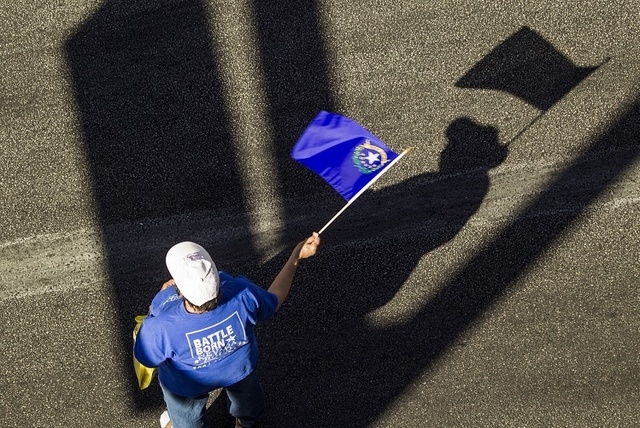For 150 years, Nevada has lived up to her motto
One hundred and fifty years ago exactly, Nevada joined a nation riven by a bloody civil war, the outcome uncertain.
And ever since, Nevada has lent its citizens, its resources and its territory to the nation and the world in times of crisis.
Back in 1866, when Nevada had been a state for just two years, the Legislature changed the official state motto to read “All for Our Country.” Those words still appear on a scroll at the bottom of the state’s great seal. It was meant to signal Nevada’s primary allegiance to the United States, which the state has proved time and again.
During World War II, Nevada worked overtime to supply the war machine. Her mines increased their production of copper and silver after the Japanese Imperial Navy attacked Pearl Harbor in 1941. The Basic Magnesium Inc. facility in what is now Henderson churned out the lightweight but strong metal to be used to make aircraft for the war effort.
The Army Air Forces built training fields in Nevada, including the Reno Army Air Base (today known as Reno’s Stead Airport), the Indian Springs Airport (now Creech Air Force Base) and the Las Vegas Army Air Field (now Nellis Air Force Base). Those bases, and others, helped train the pilots who would go on to win the war.
That’s nowhere more true than in West Wendover, where pilots of the 509th Composite Group trained for a very special mission: Their B-29 bomber, the Enola Gay, would carry the Fat Man atomic bomb detonated over Hiroshima, Japan, on Aug. 6, 1945, a successful mission that led directly to the end of World War II.
And let’s not forget that Nevada lent her name to a battleship that survived the attack on Pearl Harbor, saw action in the Atlantic and off the coast of Normandy during the D-Day invasion of June 6, 1944, and which anchored in Tokyo Harbor to witness the formal Japanese surrender on Sept. 2, 1945.
The end of the war didn’t end Nevada’s contribution to the defense readiness of the United States. What’s now known as the Nevada National Security Site was the site of more than 900 atomic blasts, starting in 1951, as the United States developed and tested its nuclear arsenal in the early days of the Cold War. The site continues to play a vital national security role for the nation.
And so does the rest of the state. The top schools for military fighter pilots are both located in Nevada: The U.S. Navy’s Strike Fighter Tactics Instruction program (better known as “Top Gun”), headquartered at Naval Air Station Fallon, and the Air Force Weapons School, located at Nellis Air Force Base. (Not only that, but the Air Force Air Demonstration Squadron, aka the Thunderbirds, is based at Nellis, too.)
And even where there are no pilots aboard, Nevada is a center for aviation. What are now called unmanned aerial systems have been run out of Creech Air Force Base near Indian Springs for years, and the state was recently designated as a testing center for what most people call “drones.” That designation is already drawing expertise and educational opportunities to Nevada, and if we keep it up, the state will be home to much more development in that arena.
And those are just the things we know about! The mysterious Area 51, aka Groom Lake, has been the place where once-secret aircraft such as the high-flying U-2 and SR-71 Blackbird spy planes and the stealthy F-117 Nighthawk were developed and tested.
From Nevada’s earliest days — when it lent its voice and its votes toward the noble cause of preserving the Union — to the dark days of World War II, the uncertain days of Cold War, to the modern days of conflict with terror, Nevada has always lived up to its motto, “All for Our Country.” That’s something to remember as we wish the Silver State a happy 150th birthday.
Steve Sebelius is a Las Vegas Review-Journal political columnist who blogs at SlashPolitics.com. Follow him on Twitter (@SteveSebelius) or reach him at 702-387-5276 or ssebelius@reviewjournal.com.






















